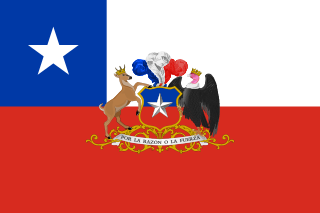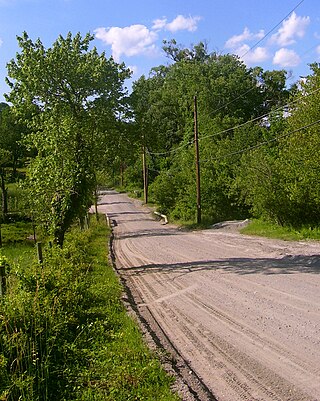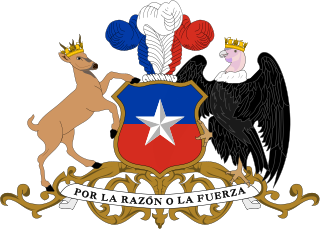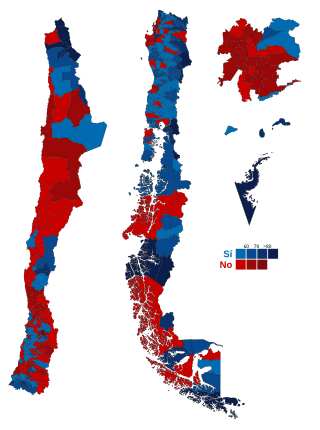
The Political Constitution of the Republic of Chile of 1980 is the fundamental law in force in Chile. It was approved and promulgated under the military dictatorship headed by Augusto Pinochet, being ratified by the Chilean citizenry through a referendum on September 11, 1980, although being held under restrictions and without electoral registers. The constitutional text took effect, in a transitory regime, on March 11, 1981, and then entered into full force on March 11, 1990, with the return to electoral democracy. It was amended for the first time in 1989, and afterward in 1991, 1994, 1997, each year from 1999 to 2001, 2003, each year from 2007 to 2015, and each year from 2017 to 2021, with the last three amendments concerning the constituent process of 2020 - 2022. In September 2005, under Ricardo Lagos's presidency, a large amendment of the Constitution was approved by parliamentarians, removing from the text some of the less democratic dispositions coming from Pinochet's regime, such as senators-for-life and appointed senators, as well as the armed forces' warranty of the democratic regime.

Elections in Chile are held nationwide, including the presidency, parliament, regional offices, and municipal positions. Chilean citizens and foreign residents with legal residency of at least five years, who are 18 years or older on election day, are eligible to vote. Previously, voting was voluntary, but since 2023, it has become compulsory.
Paulsen is a Danish, Norwegian and German patronymic surname, from the given name Paul prefix, of Latin origin, itself derived from Paulus, meaning "small". People with the name Paulsen include:

A constitutional referendum was held in Chile on 11 September 1980. The proposed new constitution would replace the 1925 constitution, and was approved by over two-thirds of voters.

The Parliamentary Era in Chile began in 1891, at the end of the Civil War, and spanned until 1925 and the establishment of the 1925 Constitution. Also called "pseudo-parliamentary" period or "Parliamentary Republic", this period was thus named because it established a quasi-parliamentary system based on the interpretation of the 1833 Constitution following the defeat of President José Manuel Balmaceda during the Civil War. As opposed to a "true parliamentary" system, the executive was not subject to the legislative power but checks and balances of executive over the legislature were weakened. The President remained the head of state but its powers and control of the government were reduced. The Parliamentary Republic lasted until the 1925 Constitution drafted by President Arturo Alessandri and his minister José Maza. The new Constitution created a presidential system, which lasted, with several modifications, until the 1973 coup d'état.

The president of Chile, officially known as the President of the Republic of Chile, is the head of state and head of government of the Republic of Chile. The President is responsible for both government administration and state administration. Although its role and significance have changed over time, and its position and relations with other actors in the national political organization have also evolved, it remains one of the most prominent political offices in the country. It is also considered one of the key institutions that form the "Historic Constitution of Chile," and is crucial to the country's political stability.

A post road is a road designated for the transportation of postal mail. In past centuries, only major towns had a post house and the roads used by post riders or mail coaches to carry mail among them were particularly important ones or, due to the special attention given them, became so. In various centuries and countries, post road became more or less equivalent to main road, royal road, or highway. The 20th century spread of postal service blurred the distinction.

Chilean nationality law is based on both principles of jus soli and jus sanguini. Nationality law is regulated by Article 10 of the Political Constitution of the Republic of Chile. The legal means to acquire nationality, formal membership in a nation, differ from the relationship of rights and obligations between a national and the nation, known as citizenship.

The 1988 Chilean national plebiscite was a presidential election in form, but not in name, as it was officially referred to as a national referendum. Held on October 5, 1988, the plebiscite aimed to determine if Augusto Pinochet, the head of a military dictatorship, should become president for eight years under resumed civilian rule. The "No" side won with 56% of the vote, marking the end of Pinochet's rule of 16 and a half years. Democratic elections were held in 1989, leading to the establishment of a new government in 1990.

The administrative division or territorial organization of Chile exemplifies characteristics of a unitary state. State administration is functionally and geographically decentralized, as appropriate for each authority in accordance with the law.
The copyright law of Chile is governed by Law No. 17,336, on Intellectual Property of October 2 of 1970 and subsequent amendments. It was implemented in the Decree No. 1122 of the Ministry of Education of Chile on May 17 of 1971.

The Constitution of 1833 was the constitution used in Chile from 1833 to 1925 when it was replaced by the Constitution of 1925. One of the most long-lived constitutions of Latin America, it was used to endorse both an authoritarian, presidential system and from 1891 onwards an oligarchic, parliamentary system.

The Constitution of 1925 was the constitution in force in Chile between 1925 and 1973 when the Government Junta suspended it. In the 1920s Chile had a severe social and economic crisis that led to the loss of prestige for old ruling class, labeled oligarchy in Chilean historiography, and the rise of a more sensibilized populist government led by Arturo Alessandri. In 1924 Alessandri was outed in a coup, but was called back in 1925 to complete his mandate. Alessandri then used his presidency to draft a new constitution to replace the Constitution of 1833. The constitution was approved by plebiscite by 134,421 voters on August 30 of 1925. Prominent features of the constitution were:

Pelucones was the name used to refer to Chilean aristocratic conservatives in early 19th century. The name "Pelucones" was originally used by the Pipiolos, or Liberals, as a derogatory term linking the conservatives to old fashioned wigs that were popular in the 18th century. Following the Chilean Civil War of 1829, when the Pipiolos were defeated, the Pelucones enforced the Chilean Constitution of 1833. This led to creation of a strong unitary, authoritarian and presidentialist system supported and maintained by the upper classes.
Plurinationality, plurinational, or plurinationalism is defined as the coexistence of two or more sealed or preserved national groups within a polity. In plurinationalism, the idea of nationality is plural, meaning there are many nationals within an organized community or body of peoples. Derived from this concept, a plurinational state is the existence of multiple political communities and constitutional asymmetry. The usage of plurinationality assists in avoiding the division of societies within a state or country. Furthermore, a plurinational democracy recognizes the multiple demoi within a polity. Reportedly the term has its origin in the Indigenous political movement in Bolivia where it was first heard of in the early 1980s. As of 2022 Bolivia and Ecuador are constitutionally defined as plurinational states.
The following lists events that happened during 1833 in Chile.
The history of the Constitution of Chile dates from 1811. There were 10 constitutional texts and a draft for a federal organization in 1826. Its common elements are the unitary form of state and presidentialism as a form of government.

The Constitutional Court of Chile is Chile's constitutional tribunal. It is not part of the judicial branch and is functionally independent of the Congress and the President. The court is housed in the Ex Caja de Crédito Hipotecario building, which is located at 1234 Huérfanos Street in downtown Santiago.

The Constitutional Convention was the constituent body of the Republic of Chile in charge of drafting a new Political Constitution of the Republic after the approval of the national plebiscite held in October 2020. Its creation and regulation were carried out through Law No. 21,200, published on 24 December 2019, which amended the Political Constitution of the Republic to include the process of drafting a new constitution. The body met for the first time on 4 July 2021. Chilean President Sebastian Piñera said, "This Constitutional Convention must, within a period of 9 months, extendable for an additional 3 months, draft and approve a new constitution for Chile, which must be ratified by the citizens through a plebiscite." It ended its functions and declared itself dissolved on 4 July 2022.










